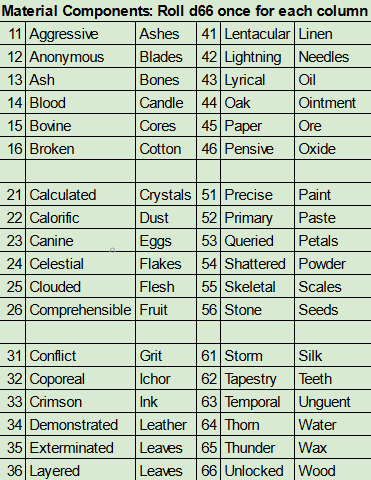#d66 table
Explore tagged Tumblr posts
Text
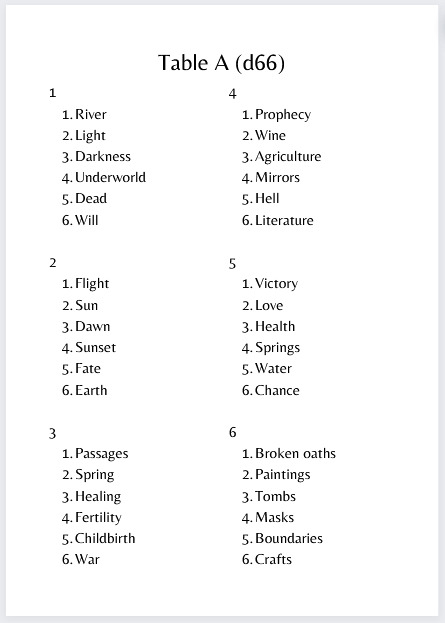
A random table for godly domains!
Part of a zine I'm working on
1 note
·
View note
Text
If There Were Two Guys on the Moon and One of Them Killed the Other With The Rock Would That Be Fucked Up or What?
A micro roleplaying blame game for two players.
You will need two six-sided dice.
You are two astronauts stuck on a science station built on the Moon. You have plenty of resources to last you until the rescue mission finally arrives, but, unfortunately, whoever planned this mission clearly ignored that you get together like oil and water.
Make your Guys. A Guy should have a name/callsign and a reason to be on the space station; everything else isn't necessary, but might be added if you want to.
Guys have only one stat, Spite, which represents their willingness to tolerate the other Guy, and starts at 1.
Each scene starts with an Issue the Guys need to deal with: something might be broken, or require routine maintenance, or work fine but in an excruciating way. Pick the culprit for the Issue, or roll on a table, using the first die as the tens digit and the second die as the ones digit.
11-13. Entertainment system. 14-16. Lighting (in the room of one's choice). 21-23. Maintenance tools. 24-26. Nutrient paste dispenser. 31-33. One of the external doors. 34-36. One of the internal doors. 41-43. Some inscrutable electronic device. 44-46. Some of the station's solar panels. 51-53. The exercise machines. 54-56. The communication system. 61-63. The cooling system. 64-66. Ventilation system.
Once the Issue is introduced, the already-worn-down Guys engage in spirited discussion (blame game) about who's responsible for the issue, and who's supposed to fix it.
At each step, the Guy may:
Make various claims on how they're, unlike the other Guy, not qualified to fix the Issue, and, therefore, the other Guy should be the one to fix it.
Call bullshit on any of the other Guy's claims, whether by drawing attention to what they said earlier or their position on the station.
Concede the argument, whether peacefully or through the Rock. This is the only way to end the issue.
To concede, roll 2d6. If the result beats the Guy's Spite, they restrain themselves and choose to concede to the other Guy, doing whatever tedious and irritating work needs to be done to resolve the Issue at hand and gaining one Spite. If they fail, they fail to restrain themselves and kill the other Guy with the Rock.
Once the Rock is used to kill a Guy, the last discussion starts, the issue at hand being the murder in question. If the murderer concedes, they acknowledge that what they did was fucked up; otherwise, they successfully rationalize their murder of the other Guy.
If 14 issues are successfully discussed without either of the Guys being murdered, they are successfully rescued by the mission control.
Every day I lament the fact that – to the best of my knowledge – there is no one-on-one indie micro-RPG titled If There Were Two Guys on the Moon and One of Them Killed the Other With a Rock Would That Be Fucked Up or What?
#ttrpg#watcher.rtf#not sure if this is really good & i definitely could make a better d66 table but i think this can suffice for now
3K notes
·
View notes
Text
A few dungeon thoughts:
Been reading Glory Hole Dwarven Mine, which is a really funny name for a module but. One of the best ideas in it is that the encounter tables are finite. Some of the entries on the tables are creatures keyed to specific locations, so if you encounter them elsewhere in the dungeon and slay them they will no longer appear in their keyed location. It also means that those entries on the encounter tables effectively become "no encounter."
This, however, with the 1 out of 6 chance for encounters means that there is a potential for two separate but connected dice rolls to result in "no encounter," which feels a bit wasteful.
TURN, by Traverse Fantasy, already sought to rectify the fact that only one number on the 1d6 used to check for encounters is used by packing the 1d6 full of information. Now it became more of a "check for random event" die.
But what if we took it further? A d66 table with distinct random events? Every turn the party travels around in the dungeon something happens. Not every one of those events has to be meaningful, because even in TURN one of the results is "free turn" which means that characters can breathe. But that could still lead to some nice color description in the table.
This will however only result in 36 unique events which will quickly run out in an extended dungeon crawl. So I think a d666 is better. Now you have 36 random events for each of the 6 types of events, and you can still do a lot with giving certain results more weight. For an example, if all "encounter" (1) results of {31,32,33,34,35,36} are goblin encounters, then that's 1/6th or all encounters, but if only an encounter result of {11} results in a dragon encounter then the dragon is exceedingly rare as an encounter. (It's 1/36th of all encounters but the actual probability of a dragon encounter happening on a given turn is actually 1/216).
65 notes
·
View notes
Text
Do you have d6s? Do you have approximately 54 seconds? Interesting in testing a spell mechanic? Here’s your mission, should you choose to accept it: roll on the d6 table and then on the d66 table. Smush the 2 resulting words together to make a spell!
(For example: move+bubble carries you and your companions over a deep chasm, or chaos+shrink changes anything in close range to half its size for the next 10 seconds)

A d66 table operates exactly like percentile dice, except with d6s instead of d10s. Roll 1d6 twice. The first number is your 10s place and the second it your 1s place. So rolling a 5 and then a 2 would be 52 on the table.

Now that you have a spell, let me know how it came out! Thanks for the help!
65 notes
·
View notes
Text

Yeah this is gonna be the longest one of them all in this project

Hm...
#me#game design#ttps rpg#ttps:gh#like 30-45% of this table is directly evel knievels career tbh#my first d66 table too#this looks better without the dark mode obv but this whole document is a draft atm
4 notes
·
View notes
Text
using 'roll d66' for 'roll two six sided dice, assign the first to the tens digit and the second to the ones digit, and compare to this table with 36 entries labelled correspondingly' is just personally offensive. how dare you use your notation inconsistently with the convention that dN is a sample drawn from a uniform distribution of every integer between 1 and N inclusive.
potential solutions:
come up with new notation. i would be partial to something like d6 X d6
call it a d36 and make everyone do d6 * 6 + d6 - 6 in their heads every time, it's fine, don't worry about it.
51 notes
·
View notes
Text
Today's mood : "Hand me an axe! Chopping to be done."
I am writing a Technicolour Post Apocalypse expansion for 6Q, it was going so well, and at almost 50 Pages my brain finally went: Hold it, 6Q doesn't need fully fleshed out item crafting, community upgrades or a bloody point crawl. So today is "kill your darlings" day. 🪓
Before I had four different random tables to generate the setting, plus the point crawl. Now it's one 6Q table. I had a core/body/mod crafting system with three d66 tables for parts. I even had three tables to generate characters. Why do you do this brain?
Chopped it all away and went back to what 6Q is all about: Answer six questions to play.
All that content will come back in some form, but not for basic 6Q. Not wasted effort, just not efficient effort.
Have any of you read 6Q already? It's free and just two pages. Would love to hear what you think, especially how you would like specific world and settings expansions to be presented.
22 notes
·
View notes
Text
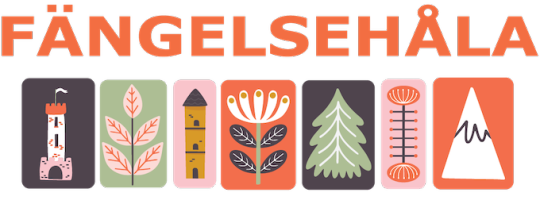
FÄNGELSEHÅLA is the Swedish word for "dungeon."
We are inviting you to play an epic adventure with the elegance of the instructions from everybody's favorite furniture store!
This tabletop role-playing game takes a minimalist approach, offering an immersive experience without the complexity. Forget thick rulebooks and intricate character sheets – FÄNG is as easy to grasp as connecting the dots in an instruction manual.
Designed for new players and one-shots that allow you to embark on quests with mechanics so straightforward that you can be up and running in minutes.

Make characters within minutes using d66 tables and jump right into the adventure!

You can choose from character options of Alv, Dvärg, Krigsman, Tomte and Trollkarl. (Elf, Dwarf, Warrior, Gnome & Wizard) Each character option providing some unique benefits in the game.
Each character also receives a heirloom and curse to help round out their back story and make the game play a little more exciting!
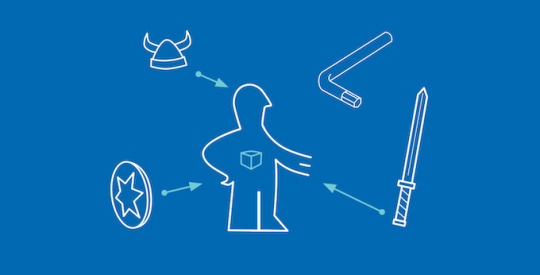

Attributes of Will, Tinker, Agile and Tuff ranging from 2-4 that are the base pool of white Action Dice as well as any extra dice added from character benefits
Top two Action Dice are totalled to beat a Difficulty score on a scale of 12
Jinx is a tie, and there is success with a complication
Use Luck Dice to improve failed Action Rolls

Difficulty Scale
<6 - Don't bother rolling... characters just do it! 6 - Pretty easy, you had better be able to do it 7 - Expected outcome, unless you mess up 8 - Pretty hard task, but not surprising that you did it 9 - Damn hard, but with all your concentration, you can do it 10 - Very difficult, to the point that pulling it off is surprising 11 - Almost Impossible... don’t kill yourself in the process 12 - Impossible... best you can hope for is a Jinx
The "DOOM STACK" for Tactile Game Play
Character damage and trauma is tracked with black Doom Dice which you stack on the table - or track on character sheet if you are on a wobbly table, camping, or just think it's too gimmicky (it's fun though... you should try it!)
Difference between the Action Roll and Monster Difficulty is Doom to the loser
If your Doom Stack tumbles during battle, the character is unconscious, or you trigger a trap if you accidentally knock them over while getting a snack!
Risk using Doom Dice to help Action Rolls but then add them to your Doom Stack
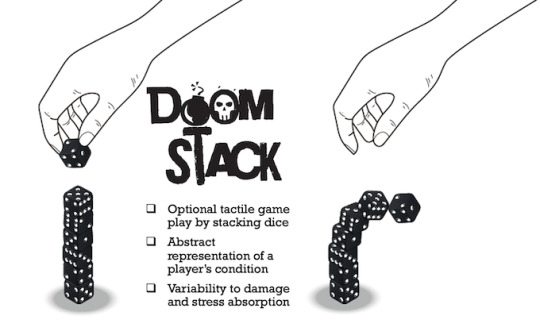
* Dice are not included as part of the game, but hopefully you have some extra lying around, or can find some at your Friendly Local Game Store. It's not necessary to have different colors of dice (white, black and a third color for luck), but it makes game play a bit more clear! Dice with dots tend to work better than numbers, for quickly determining success.
* The base game mechanics were inspired by the d6 system first developed for Ghostbusters RPG by Sandy Petersen, Lynn Willis & Greg Stafford, which has been foundational for dice pool mechanics across many TTRPGs

Each adventure is minimal game prep from random d66 tables that provides the dungeon rooms and its contents. It's so easy that you can probably even run it without a Doomsayer (Game Master).
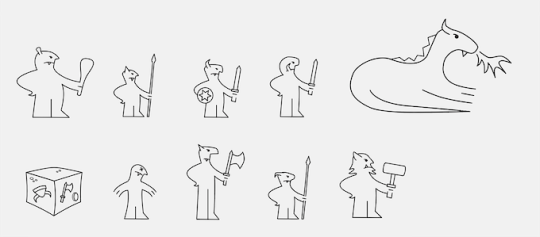

In true ZineQuest fashion, you will receive a 36-page saddle-stitched landscape digest-sized zine (5.5"H x 8.5"W), with black and white interior pages and heavyweight card-stock color cover and inside cover pages.
This format was chosen to lie flat and be accessible while you roll on the d66 tables. It has the bonus of looking like an instruction manual!
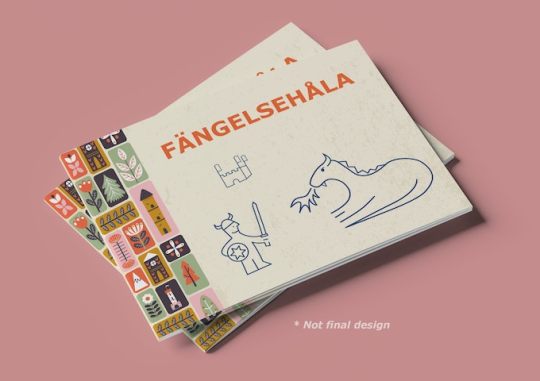
Kickstarter campaign ends: Wed, February 21 2024 3:05 AM UTC +00:00
Website: [Dieku Games] [facebook] [twitter] [instagram]
62 notes
·
View notes
Text
Let's make a Henchwoman!
At last, I have the rules of Henchwoman RPG, a hack of Maid RPG about playing villainous Henchwomen, worked out enough to make a sample character! Shall we do so?
First, for the whole group, roll D66 to find a Theme.

We rolled 3 and 6, which gives us...Space! That's a pretty cool theme, I think! Let's go on and personalize one of our space age Henchwomen!
Next up, we roll stats, each one being 2D6/3, rounded down. This lady's starting stats are thus Athletics (fighting or other physical activity) 1, Charm (forming bonds with other characters) 3, Skill (being good at actual henching) 3, Cunning (deception and trickery) 1, Luck (just plain luck) 3, Will (determination under duress) 2. But wait, we have to modify those stats!
What Type of Henchwoman is she?

We rolled 2D6, and rolled 3 and 4, giving us Sweet and Cold. An interesting combination! It looks like this woman is chilly and professional on the outside, but with a heart of gold! Her Skill is now 4, and her Cunning is now 0!
Now, what does she look like? Or at least, what's her Color pallet?

Rolling 3D66, we got 5 and 6 for Metallic eyes, 1 and 6 for Vermillion hair, and 2 and 4 for a Sky Blue uniform. Looking good!
But there's still a lot more to go!
Let's personalize this sweet, cold, shiny space minion and give her some Special Qualities!



We roll 2D66 for this. First we get 2 and 6, giving us Greedy (can we really blame her?) and 6 and 3, Shapeshifter. But what can she shapeshift into? Let's look at a supplementary table to find that out!

We rolled 6, meaning she can turn into a snake. Yikes!
But what's a nice snake girl like this doing in a place like that- what are her Roots?


We rolled 1D66 and got 1 and 4, which makes her an Intern. Her space college must have a field work term.
What happens if things get too stressful for her to handle? What's her Stress Explosion?


We rolled 1D66 to get 5 and 5, meaning she blows off steam playing Video Games until she feels better. We've all been there!
That stress may have come from fighting- she is a Henchwoman, after all. What's her Weapon?

We rolled 1D6 and got a 6, giving her Magic and/or Minor Superpowers! Let's say she can spit venom, as befits her snake form. Unorthodox but effective!
Does she have any other Powers? For this, we look back at her stats. Her highest stat is Skill, so we roll on that supplementary table to find out what she's good at.

We rolled 1D6 and got 2, giving her Cold Read. If you look into those beautiful metallic eyes, beware, for they're looking right back at you!
Finally, her starting Favor (how much the Villain likes her performance, and the object of the game) is her Charm times 2, which is 6. Don't worry, she can go up and down in actual gameplay! Her Spirit, which keeps her going under pressure, is Will times 10, which is 20.
So here we have a Henchwoman I'll call Ophiucha, after an esoteric snake constellation. Her eyes are metallic, her hair is vermillion, and her uniform is sky blue. She's is sweet but cold, a little bit greedy, and can turn into a snake. She's here on an internship, and blows off stress playing video games. She fights by spitting venom, and she can read your face like a book.
Seems pretty cool to me!
Next, I'll be working on tables to make the Villain. Stay tuned!
61 notes
·
View notes
Text
d6s are my favorite die to make tables with b/c you can do so much with them. And most people have them laying around somewhere!
There's the standard 1d6 table. Clean. Simple. You can even mix things up and weight results with a "1-3", "4-5", and "6" setup, etc etc.
You can do 2d6 and have a weighted set of 11 results in a nice little bell curve.
You can break those 2d6 apart and set up rows vs columns, you can even set up weighted rows and columns.
You could do d66 and have 36 total results. You can even subdivide that into six groups of six! You can go wild and do d666 and have so many results (shout out to FIST!).
The possibilities are so many.
In summary, d6 tables?

107 notes
·
View notes
Text
An oracle zine with 60+ results per page for any solo RPG
My Zine Month project is up! 🎲🎲
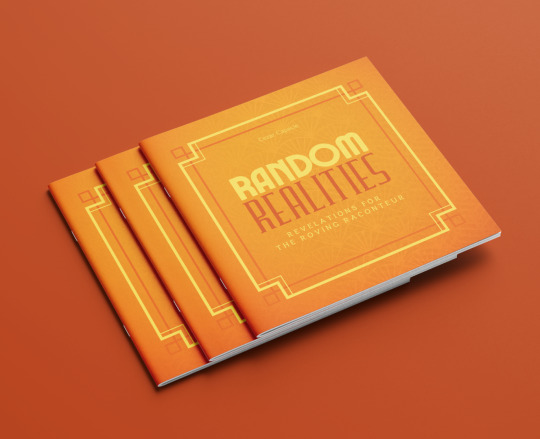
Introducing 'Random Realities', an oracle zine for all your solo RPG needs!
Roll a d66, flip a page, or roll the dice inside the PDF (yup, that's right) and get 60+ oracle results on every page!
Here's a sample page of the zine.

Envision worlds, quests, people, scenes, creatures, items, and more on a glance!
If you're familiar with oracle decks, it's the same principle, but in a convenient zine format.
The PDF comes with a function that allows you to click on the dice (or on the title of any category) and it takes you to another random page!
It's pretty magical!
If you are using the physical version, you can simply flip to a random page, or roll d66 and go to the corresponding page, following the dice results in the bottom right corner.
And it's all there, no need to flip through to find the right table for the right scenario.
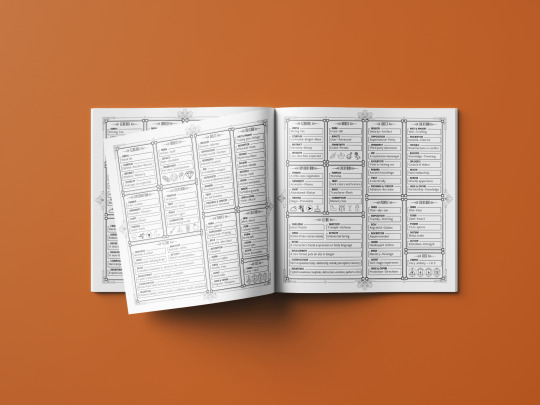
The results vary from more abstract words and terms open to interpretation, to more direct and guided results, combined with evocative icons to spark your imagination.
I drew from the 30+ games I've made to collect the most practical and evocative oracles I could devise.
My hope is that you can grab this zine and your favorite system, and jump to an adventure in no time.
If that's your jam, check out the campaign and spread the word! 💗
43 notes
·
View notes
Text
Here's a tabletop RPG history question, and also an etymology question if your nerdery bends that way.
d66 tables – as in "roll a six-sided die twice, reading the first roll as the 'tens' place and the second roll as the 'ones' place, yielding a number in the range from 11 to 66" – have been around at least as early as 1977, when the Starships book for classic Traveller used them to randomly generate trade goods for players to buy. However, the term "d66" wasn't yet being used to describe them – the book's text simply describes in detail how to roll on them each time such a table appears.
Conversely, we know the term "d66" was being used to describe this type of random lookup table no later than 2004, because several popular Japanese indie RPGs which came out in that year use it. However, none of these games seem to have originated it – the way they're using it suggests they're dropping a piece of jargon that was already well established at the time.
So the question is: what's the earliest tabletop RPG that specifically uses the term "d66" or "d66 table" to describe this type of random lookup roll? i.e., not "d6/d6" or "d6,d6" or any alternative verbiage, but "d66" specifically? It has to have been published in or before 2004, and (probably) not earlier than 1977. No speculation about which games might have used it, please; if you're going to suggest a candidate, be prepared to cite a specific title and page number.
3K notes
·
View notes
Text
Would y'all pay Kickstarter money for the opportunity to be listed on a D66 table as potential victims to get devoured by monster PCs in Eureka: Investigative Urban Fantasy..? Like, if we made it a backer tier where you get to write yourself (description, name, where you are, what you're doing, NPC stats, etc.) onto a table that is rolled on to see what feeding opportunities monster PCs find when hunting?
This tier would also include as a reward the full rulebook and several adventure modules.
(Was going to add a "No" option, but that would just make it harder to count how many people actually like the idea. If your answer is No, just reblog the post without voting.)
#eureka#eureka: investigative urban fantasy#monster characters in eureka#monstergirl#ttrpg#roleplaying#tabletop#indie rpg#monster girl#monster#monsters#monster boy#monster girls#coc#dnd#rpg
43 notes
·
View notes
Text
This Game Is Familiar
This Game Is Familiar, Beebo Bunkums, 2022
There are so many jokes one could make here about TGIF and "but I haven't even seen it before" and "In Soviet Russia...", so hopefully you can fill those in yourself.
In This Game Is Familiar (TGIF) you play spellcasters' familiars. The game uses the term "witches, wizards, and warlocks", so I guess the implication is that warlocks are non-binary, which I think the NB folks I know would be down for. You could be helping your caster succeed in school or work, rescuing them from their nemesis, keeping from embarrassing themselves, etc. It's much more on the "beer and pretzels" side than the "serious games about serious topics" side. Or maybe on the "together they fight crime" side.
The mechanics are in the Honey Heist / Lasers & Feelings area, with two axes instead of one. Axis #1 is Size vs. Speed. Axis #2 is Power vs. Personality. Each axis has to add to 7 independently, and you do the usual 1d6+stat. After that comes a power system that's pretty similar to the one in Everway. I think it evolved separately, but it's possible that (checks author credit) (checks it again) Beebo Bunkums did read Everway and decided to house-rule things. There's a page full of d66 tables with personality quirks.
It's a little unusual to see any substantial add-ons for a L&F hack. In addition, the powers don't really mesh with the rest of the mechanics - they're more in the "it works or it doesn't" category, like flight or not having to breathe. I wonder whether BB is actually two people who mashed their games together.
The game's setting is just sort of an assumed-D&D-type world. There's nothing explicit beyond the existence of spellcasters and some sort of magic society, so you could theoretically play this in a high-tech setting if you wanted. You'll just have to do the work of setting-building yourself.
The art is part scratchy b/w linework and part greyscale watercolor, which lends a little more credence to the "two authors" theory. The linework has the "creepy but friendly" style, where that crow could stop snacking on an eye long enough to give you a hand with the stuff on the high shelf. The watercolors are more in the Addams Family style, morose but morbidly funny.
The game's on itch, but you probably figured that out from the title and author. It's only 13 pages but it's nice and cheap.
14 notes
·
View notes
Note
I consider myself a game dev. Maybe not a *good* one, some of my favorite elements of gameplay tend to be somewhat counter-cultural nowadays (from what I can infer, at least). So, I ask you, what do you consider the best design philosophies and goals to come out of the modern TTRPG game dev scene, in comparison to their predecessors? I’m not as locked in to the current zeitgeist as I’d want to be, so I thought it would be best to just straight up ask.
I'm not tapped into modern TTRPG design too well either, and to be fair it's not like there is anything approaching a consensus on what the best practices in gameplay and game design are, but if I had to pick some of my favorite design trends present in a few of my favorite modern indie games (including, but not limited to, Slugblaster, Break!!, FIST, Greed, Eureka, Hypermall Unlimited Violence, etc.):
Emphasis on open-ended scenarios with multiple avenues of approach.
Gameplay that emphasizes player characters driving the gameplay instead of the story happening around them. (FIST and Eureka are the clearest examples of this, and I feel FIST in particular encourages "weaponizing agency.")
Failure is an option but also interesting. While I do think it's valid to bake in failure as an option in a very traditional challenge game style where if characters fuck around they die, I think building other consequences around failure than just character death is a good design trend. And heck, just the idea that scenarios can be failed without the narrative grinding to a halt is good.
Games should be allowed to be weird and idiosyncratic and have uncompromising visions instead of trying to cater to the widest possible audience, thus losing everything that makes them unique.
Lots of d66 tables.
But again I'm not sure if those are wider trends, just some things I've noticed in the games I've liked. The games I mentioned are not an exhaustive list and each of those pretty much represents a very different type of design, but I feel it's a good snapshot of what's going on.
16 notes
·
View notes
